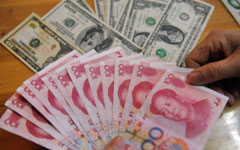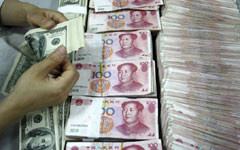The return of the renminbi rant
Updated: 2014-05-05 08:22
By Stephen S.Roach (China Daily)
|
|||||||||||
This argument is politically expedient - but wrong. The US trade deficit is a multilateral imbalance with many countries - 102 in all - not a bilateral problem with China. It arises not from the alleged manipulation of the renminbi, but from the simple fact that America does not save.
Lacking in domestic savings and wanting to grow, the US must import surplus savings from abroad, and run massive current-account deficits to attract the foreign capital. And that leads to America's multilateral trade imbalance. Yes, trade with China is the largest component of this imbalance, but that largely reflects the complexity of multinational supply chains and the benefits of offshore efficiency solutions.
 |
 |
|
 |
As China rebalances toward a growth model that draws greater support from domestic demand, Washington should stop ranting about the renminbi and start focusing on the opportunities that this bonanza will create. That means emphasizing US companies' access to China's domestic goods and services markets. Pushing for a bilateral investment treaty that relaxes caps on foreign ownership in both countries would be an important step in that direction.
Similarly, the US needs to give China credit for having taken meaningful steps on the road to further currency reform. The mid-March widening of the daily renminbi-dollar trading bands to plus or minus 2 percent (from the earlier 1 percent band) is an important step in relaxing control over the so-called managed float. That, coupled with the 3 percent depreciation in the past few months, should send a strong signal to speculators that one-way renminbi bets are hazardous - a signal that could help dampen inflows of hot money, which have complicated liquidity management and fueled asset-market volatility in China.
There are two views of the future of the US-China economic relationship: one that sees only risk, and another that sees opportunity. Fixating on the renminbi falls into the former category: It misses the rebalancing and reforms already under way in China and deflects America's focus from addressing its most serious long-term macroeconomic problem - a lack of saving.
By contrast, viewing China as an opportunity underscores the need for America to undertake its own rebalancing - rebuilding US competitiveness and pushing for a meaningful share of China's coming boom in domestic demand. Unfortunately, the revival in US saving that this will require is being drowned out by the renminbi rant.
The author, a faculty member at Yale University and former Chairman of Morgan Stanley Asia, is the author of a new book Unbalanced: The Codependency of America and China. Project Syndicate
Related Stories
US Treasury declines to name China as currency manipulator 2014-04-16 07:54
US urged to 'understand' yuan issue 2014-04-17 08:46
RMB to be global reserve currency by 2030: Economist 2014-04-09 23:51
RMB internationalization could transform global markets 2014-03-26 13:21
Do not hype yuan fluctuation: MOC 2014-03-18 13:36
First trading day smooth with wider band 2014-03-18 09:28
Today's Top News
Deal signed to upgrade roads, grid in Ethiopia
Tokyo lawmakers begin China visit
Foreign spies busted in Guangdong
Iran test-fires air defense system
Yunnan's only panda perking up thanks to TV
Intl cooperation to aid drug fight
Senior Chongqing official investigated
Driver of overturned car linked to 2009 fatal wreck
Hot Topics
Lunar probe , China growth forecasts, Emission rules get tougher, China seen through 'colored lens', International board,
Editor's Picks

|

|

|

|

|

|





